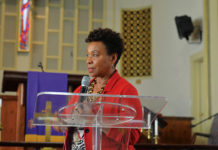
by Sam Moore
Congresswoman Barbara Lee, D-Oakland, held a joint town hall on race last Saturday, April 27, at the Black Repertory Group Theater in Berkeley. It was the fourth of its kind hosted by Lee. The events, held in what she called the “wokest district in the country,” serve as conversations, she said, about “how to repair the generational damage” left by racist policies at local and institutional levels.
The event was hosted by Congresswoman Lee and fellow Bay Area representative Congressman Mark DeSaulnier, D-Concord. It was moderated by Alameda County Supervisor Keith Carson and featured a panel of professors and racial justice activists.
The discussion was built around questions submitted from audience members, which touched on issues such as gentrification, environmental racism, social media and representation.
“When we say we want to talk about race,” said panelist Chinyere Oparah, a professor of ethnic studies at Mills College, “the assumption is that the conversation will be divisive. That assumption is a divisive tactic.” Discussions about race, she said, should be intergenerational and include people from different walks of life – a testament true to the audience that packed the theater.
“When we say we want to talk about race,” said panelist Chinyere Oparah, a professor of ethnic studies at Mills College, “the assumption is that the conversation will be divisive. That assumption is a divisive tactic.”
“We’ll never get anywhere in terms of dialogue if we leave race out of the conversation,” said Congresswoman Lee.
These conversations are especially important now, she added, because of “the environment that has been created by the Trump administration.”
“Soon we’re going to have a country where it’s OK to be violent,” Lee said, discussing the resurgence of white supremacist attitudes following Trump’s election.

Though this environment is being created across the country, the panelists agreed that there’s plenty of work to be done here in the Bay Area.
Panelist Vanessa Moses spoke of her work as executive director of Causa Justa, a grassroots nonprofit that aims to build power among local working class Black and Latinx communities. Much of her mission centers around countering the displacement caused by gentrification.
Between 2000 and 2014, she said, Oakland lost 31 percent of its Black population. In 2017, there was a 25 percent reduction in the Mission District’s Latinx residents.
“The work around anti-displacement is inherently work for racial justice,” Moses said.
“The work around anti-displacement is inherently work for racial justice,” said Causa Justa Executive Director Vanessa Moses.

Panelist john a. powell, director of the UC Berkeley Haas Institute for a Fair and Inclusive Society, said that there is nothing being done at an institutional level to thwart gentrification and that new policies should be written to change that. (powell spells his name in lowercase as part of the belief that we should be “part of the universe, not over it, as capitals signify.”)
When asked about America’s tendency to talk about race in terms of a “Black and White binary,” powell suggested we view it instead as a paradigm, in which people are treated according to their proximity to Whiteness or their distance from Blackness. Whiteness, he said, was constructed as “an ideology of domination,” one that affects all people of color but Black people especially.
Whiteness, said john a. powell, director of the UC Berkeley Haas Institute for a Fair and Inclusive Society, was constructed as “an ideology of domination,” one that affects all people of color but Black people especially.
“The racial construction of America is not just about people,” he added, suggesting that the concepts of Whiteness and Blackness in America go beyond being identifiers for people’s race, and also function as structural ideologies.
In response to the same question, Congresswoman Lee said that “we have to look back and unravel the basis of inequality for all people of color.” She mentioned that this year marks four centuries since enslaved people were first brought to North America from Africa.
“You look at every aspect of this society,” she said, “and you see a direct connection to the Middle Passage.”
“You look at every aspect of this society,” said Congresswoman Barbara Lee, “and you see a direct connection to the Middle Passage.”
She concluded the town hall by encouraging people to “talk to others; have these tough conversations.”
Congresswoman Lee has served as a U.S. Representative since 1998. Her district includes Oakland, Berkeley, Alameda, Emeryville, Albany, Piedmont and San Leandro.
Sam Moore, a San Francisco State University journalism student, is an intern with the Bay View. He can be reached at samoore2015@gmail.com.

 Store
Store












